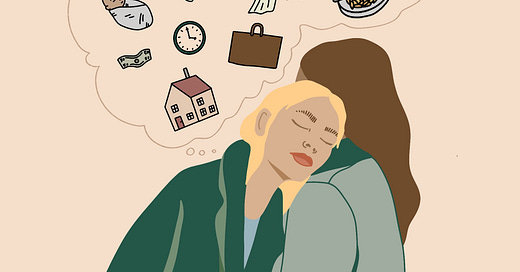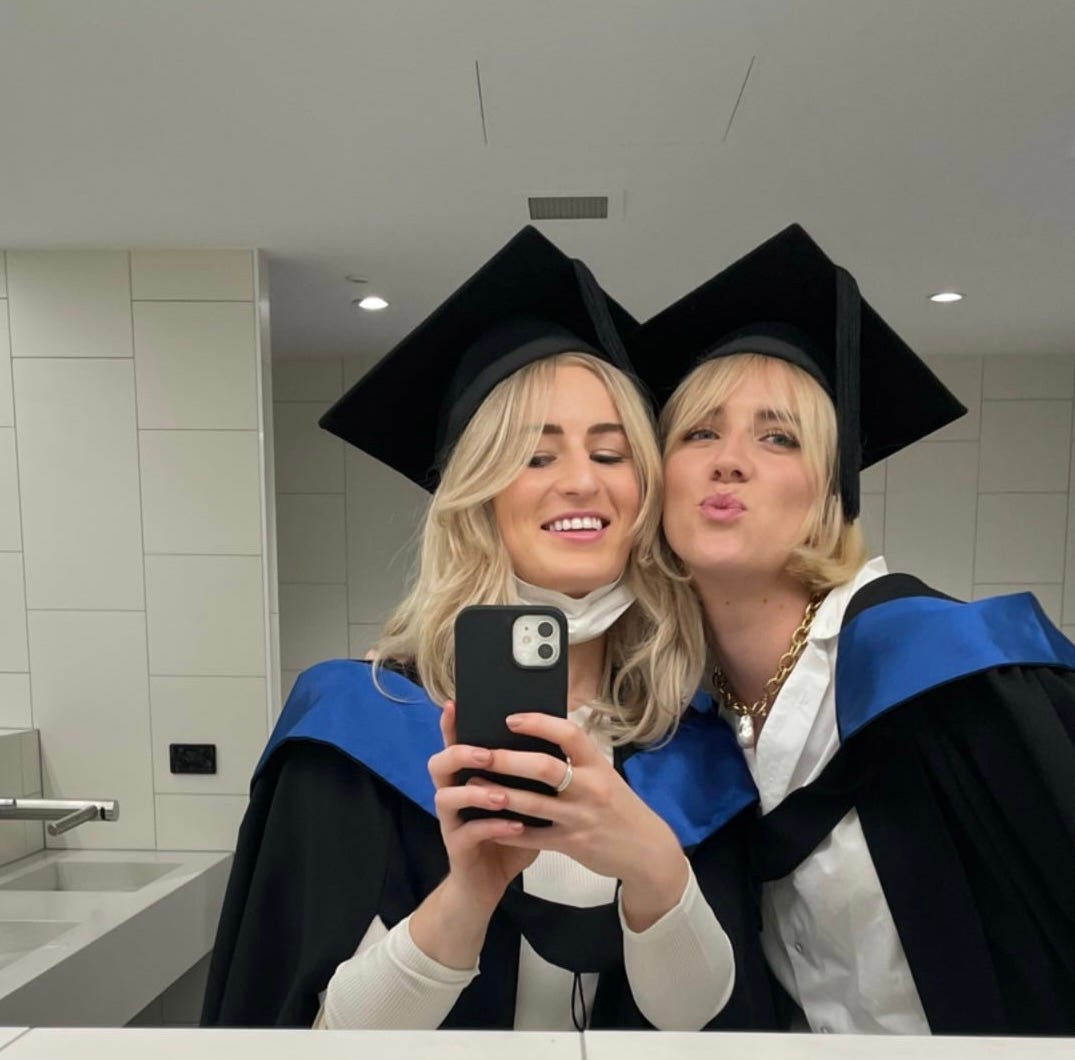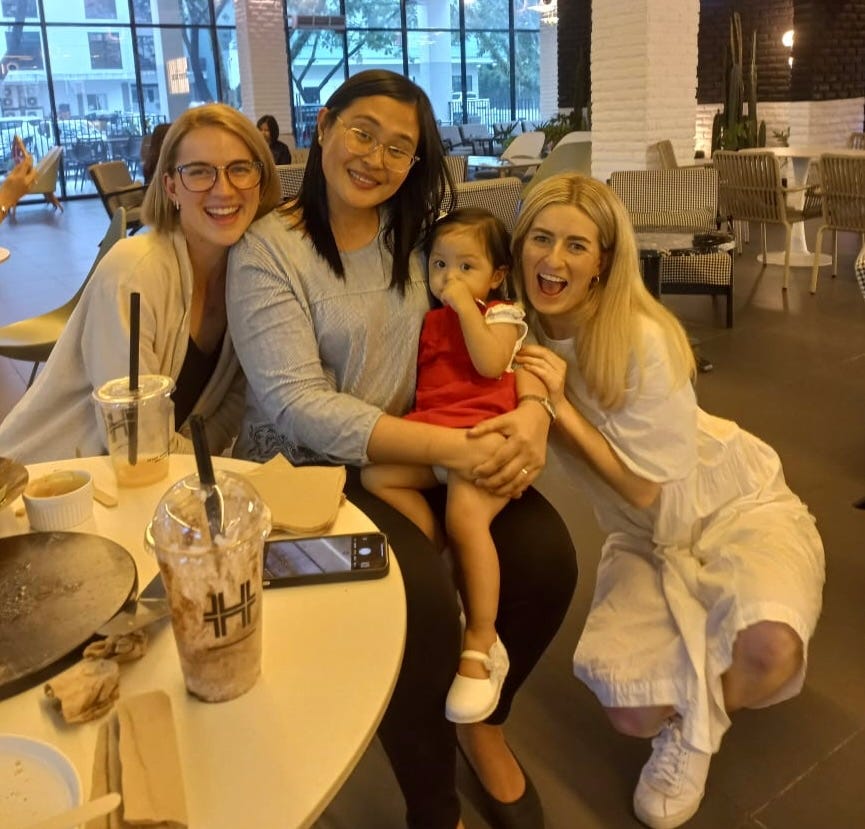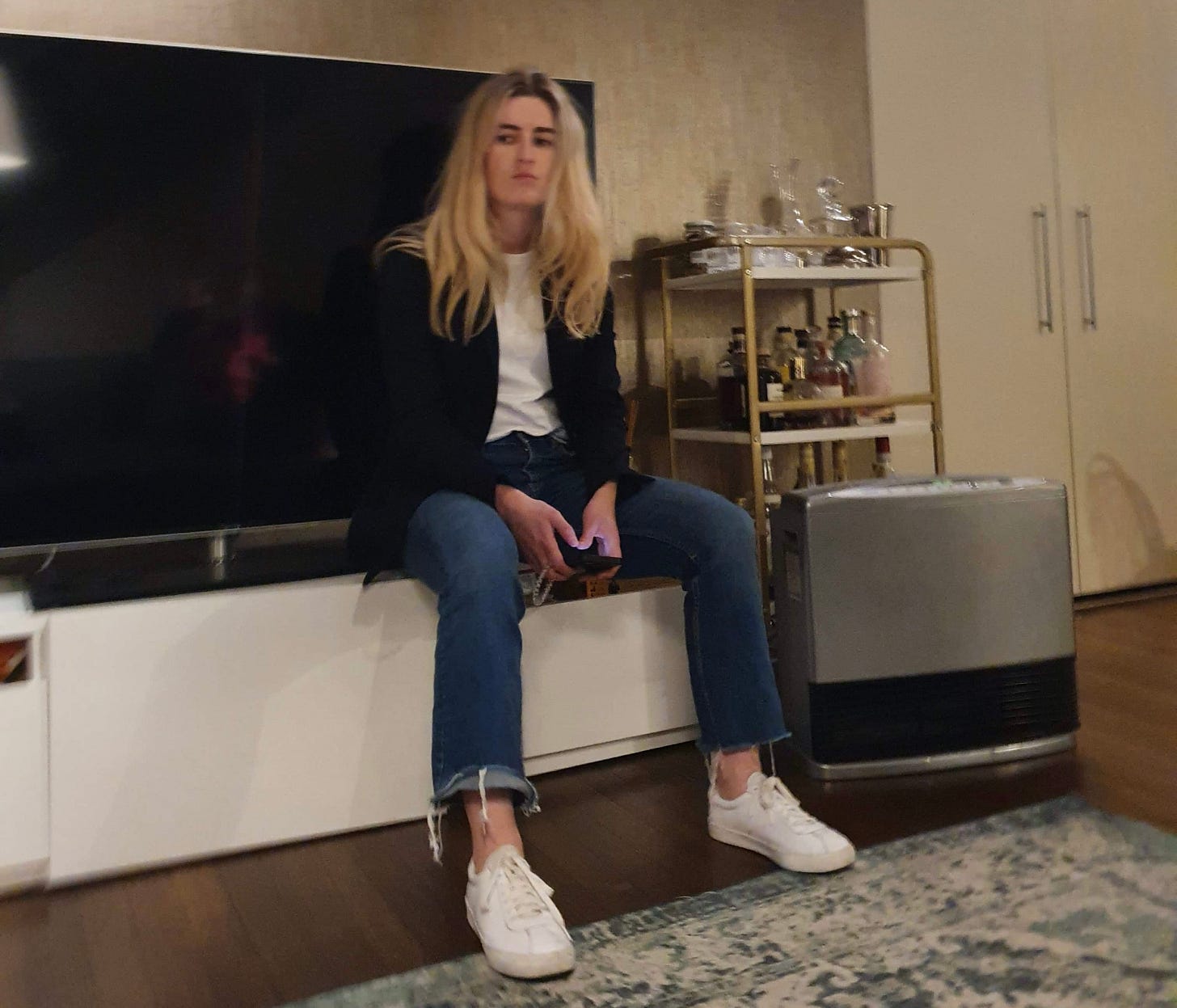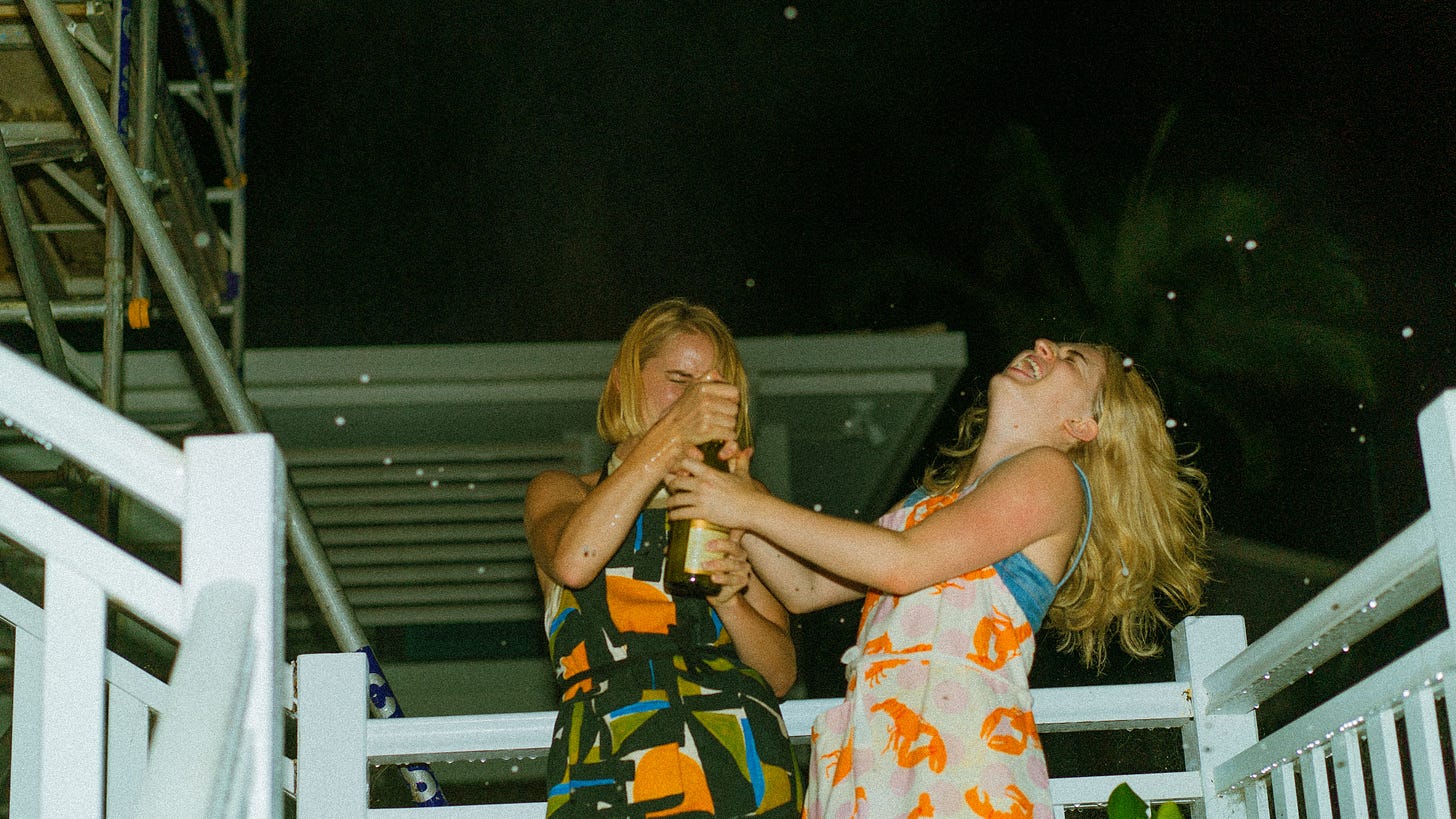How it started
At the end of university, my best friend, Rory, and I dreamed of freedom and adventure. With six months between finishing our degrees and starting our graduate consulting jobs, we pictured ourselves soaking up life in a French village, working as baristas to fund our travels. But when COVID closed borders, instead Rory became a barista at East Leagues Club in Brisbane and I was thinking of ways to make this unexpected downtime meaningful. It was then, in our beloved Kangaroo Point sharehouse, that Athena was born.
Athena
Athena was a ‘life logistics’ service to support busy families (read women) with routine tasks and everyday chores. We were the venn between Airtasker and a Personal Assistant. If men got to outsource lawn mowing, home repairs and appliance installation, why shouldn’t women remove the burden of some of the domestic tasks that they typically do?
We named the business Athena after seeing a quote that referred to her as the goddess of ‘war, strategy and homemaking.’ While possibly not 100% accurate in ancient Greek mythology, it struck a nerve. We felt as though the women in our lives and workplaces were constantly strategising their way through household and child management - carrying the cognitive load involved in running a family.
Athena was downright adorable and we offered a great service. Think cleaning out garages, selling second-hand school uniforms, finding quotes to restore furniture, formatting resumes and the list goes on.
Prospective customers reacted with emotionally laden, ‘I NEED THIS’ responses to our pitch. One woman literally sobbed to us about the loneliness she experienced in carrying the mental load. But we struggled to convert them into paying customers. There was a huge emotional hurdle to get women to pay for something that we typically shame them for outsourcing. We thought that if individuals struggled to justify the expense, what if employers, keen to attract and retain talent, might see value in providing life admin support as an employee benefit.
Typically, employee ‘benefits’ outside of health insurance and work from home flexibility aren’t seen as particularly impactful. Online counselling, gym memberships, lunchtime yoga classes and product discounts don’t add much value to people if they barely have enough time for their regular work and family responsibilities. In 2021's tight talent market, it astounded us. Outside one or two luxury concierge services, there were no employee assistance programs we could find that provided tangible, hands on support to people. Support that would no doubt reduce post-COVID burnout and increase productivity.
We connected with one of our future employers who heard the idea and connected us with a young and vibrant tech startup founder. Equally as passionate about what we were doing, she had previously sketched out the idea but didn’t have the time to work on it. She agreed to take us under her wing and invest in us to get it off the ground. Two weeks after this fateful connection we packed our cars, went to our graduation ceremony and drove down to Sydney the following day.
Athena becomes Dara
Overnight, Athena transformed into a tech company called Dara. With the cost of labour, there was no way we were going to crack the economics to provide an in-person service like we were in Brisbane. But believed there were enough life admin tasks that could be completed remotely and that a product like this would still add value. From our investor’s office, we spent 6 weeks building a pilot product which essentially provided people with virtual assistant access for between 3 and 6 hours a week.
We used a CRM platform that integrated with WhatsApp, text and an instant payment app (this let us collect money from clients before making purchases on their behalf). It was a humble frankenstein of a software stack. But, it enabled us to test our product and collect customer feedback before spending any funds on custom software or AI.
Our first customers paid about $300 a week for 3 hours of ‘life admin support.’ The ‘Dara’s consisted of Rory and I plus a small team of virtual assistants in the Philippines - Olivia, Maynard, Dwayne, Joyce-Anne and Princess. This primarily took the form of grocery orders, finding quotes for tradespeople, booking appointments, signing up for kids' extra curricular activities and so on. See Yohana for a visual idea of what we did. They have built something that closely aligns with our vision and nailed the communication of the range of tasks that they handle.
When it came time to finding pilot customers, we had access to our investor’s network of high-earning, white collar families who were able to entertain the idea of spending $300/week on extra family support. Every time we pitched the idea to this group (and beyond), they were always behind it notionally. However major emotional bottlenecks held us back from converting them into customers.
For many women, signing up to Dara wasn’t just a transaction; it was an admission that they couldn’t do it all - a social expectation of the millenial/Gen X generation. Women often felt immense guilt for outsourcing family admin tasks they believed they should handle themselves, thanks to deeply ingrained norms that make women feel bad for literally anything.
If we got past this, they then needed to believe that Dara could do their tasks better than they could, which was impossible at the relatively ‘affordable’ price we were charging. Finally, there would be times where we had almost converted a client and they would say they first needed to ‘consult their husbands,’ who would turn around and respond with, ‘do we really need that?’
In the Phillipines with Oliva
The business model was clunky
The clients that did follow through often did so hesitantly and to be honest, it was fairly demoralising to try to serve them. No amount of training could overcome the inherent cultural barriers between our clients and our Philippines staff. It was obviously unrealistic to expect that a non-local Dara would have the language, empathy and nuance to achieve a hard-to-get fine dining Sydney restaurant booking, as Rory or I could.
We didn’t educate our customers well enough about the fact that we would not be able to complete every life admin task that they ever needed. Or, that for more difficult tasks they might need to provide higher quality instructions. Where Dara thrived was in the 30% of repetitive tasks that don’t require huge amounts of nuance. To succeed we had to convince customers that while we couldn’t do everything, we could remove a sizable chunk of their mental load. That was the value.
There were clearly problems with the efficacy of the product and customers doubted the value from day one. These were tough commercial hurdles to overcome but the real reason we decided to move on from Dara was because for a product like this to have a chance, there was still much societal change needed. Predominantly, we’d have to progress the conversation about the socioeconomic burden of unpaid domestic labour/ the mental load for a market to exist for this product
Existential times
We were too early
Trying to change behaviour in a demographic who’d already had children and developed their survival strategy was an uphill battle. The ABS has reported that Millennial and Gen X women are the most overworked group of people due to full time work, caring for young children, ageing parents, and face financial pressures. While this would have been an obvious group to target, they were often impenetrable.
We found that they were broadly in survival mode and didn’t have the emotional bandwidth to meaningfully engage with the product. We thought about targeting our own demographic (young millennials and Gen Z) but we just couldn’t provide a product that would have been financially palatable.
Throughout the Athena/Dara journey we learned so much about unpaid labour and the cognitive load of women. Especially via seminal economists and sociologists like Silvia Federici and Marilyn Waring plus newer voices on the topic such as Eve Rodsky and Leah Rupparunner. We realised how the caring, mental and emotional load of women has been grossly under factored in the global economy. Ie. The economy could not handle the situation where women stop doing unpaid work.
Rory became obsessed with the ABS ‘time use’ survey. She found, after trawling through decades of data, that most tasks involved in running a home and raising children weren’t properly acknowledged or captured. Even three years ago, this conversation wasn’t mainstream. While women were able to articulate the feeling of the weight of the mental load, the language we use now to define it was emerging.
All of this to say that it was challenging to convince future investors and corporate clients of the market opportunity. We’d present statistics that stated unpaid care work is equivalent to 50.6% of GDP. But since it isn’t actually counted in GDP, it came across as too abstract. Subsequently, Pivotal Ventures, a fund founded by Melinda French Gates, investing in female-led companies, has reported a $648B market opportunity related to the care economy.
We always felt that we were ‘10 years too early’ which you need to be if you’re going to build a generational product. But we were 24, capital deficient (and iron deficient) and realised this was always something we could return to after further career experience and personal growth.
Conclusion
Being seen trying and ultimately failing is vulnerable and embarrassing. Though we remain proud to have tried something interesting and weird at a stage of life where we were relatively unrestrained with too many adult responsibilities.
We learned life lessons that had we not ventured down this path, we may not have learned until our 40s or 50s. We received rare insight into the personal lives of highly successful women. The surprising lesson we hold the closest was that (for the most part) following Dara, we no longer aspire to the lives we originally desired. Rather than working towards the perfect life on paper, we are focussed on creating lives with space for joy, peace and unconditional permission to relax.
At the start, Rory and I very consciously decided that our friendship would always come first. We weren’t willing to lose our bond over an experimental project straight out of uni. While I am proud of what we achieved in the business, I am most proud that we came out of this experience with a stronger relationship than we did going in.
Our final Dara bank balance was transferred to an account we called the ‘Friendship Fund’ which we use to catch up regularly for dinner guilt-free at our favourite restaurant. Our runway is probably another 6 months. We’re currently taking EOIs for our Friendship Fund II - raising begins next year…


